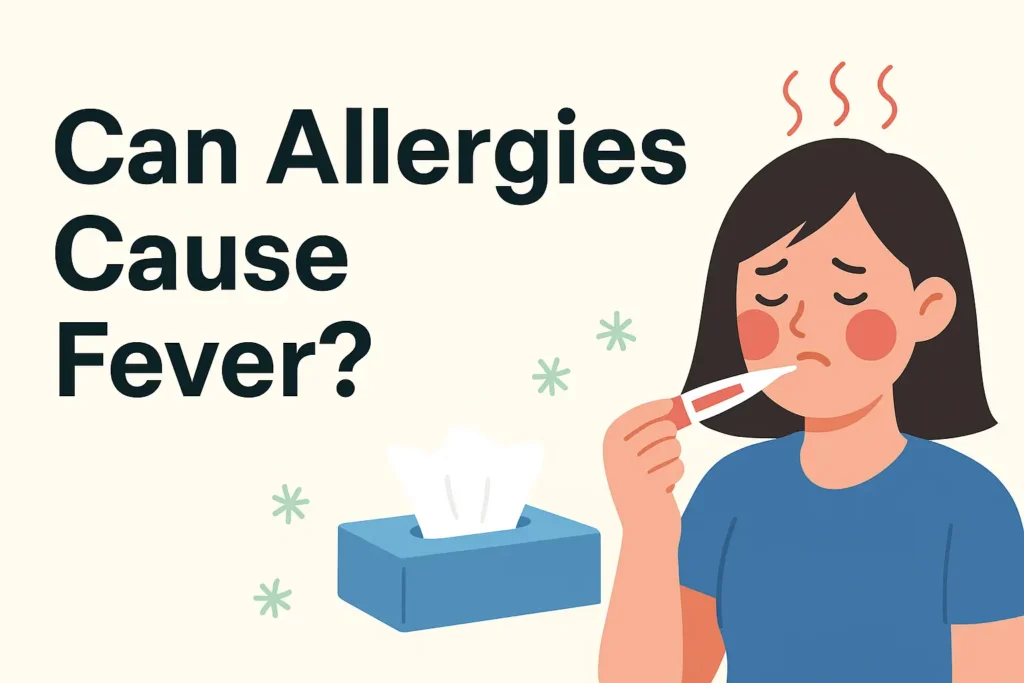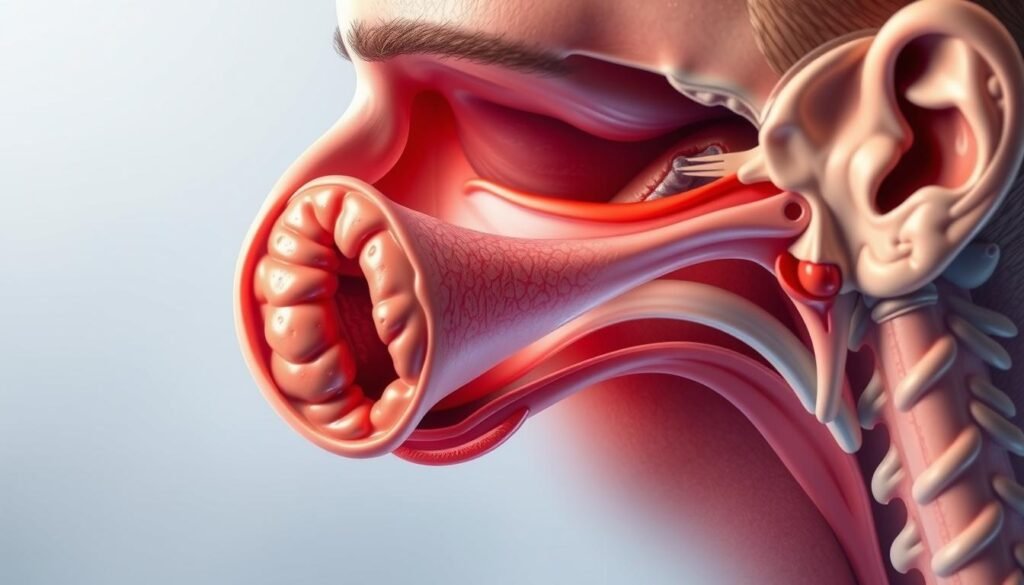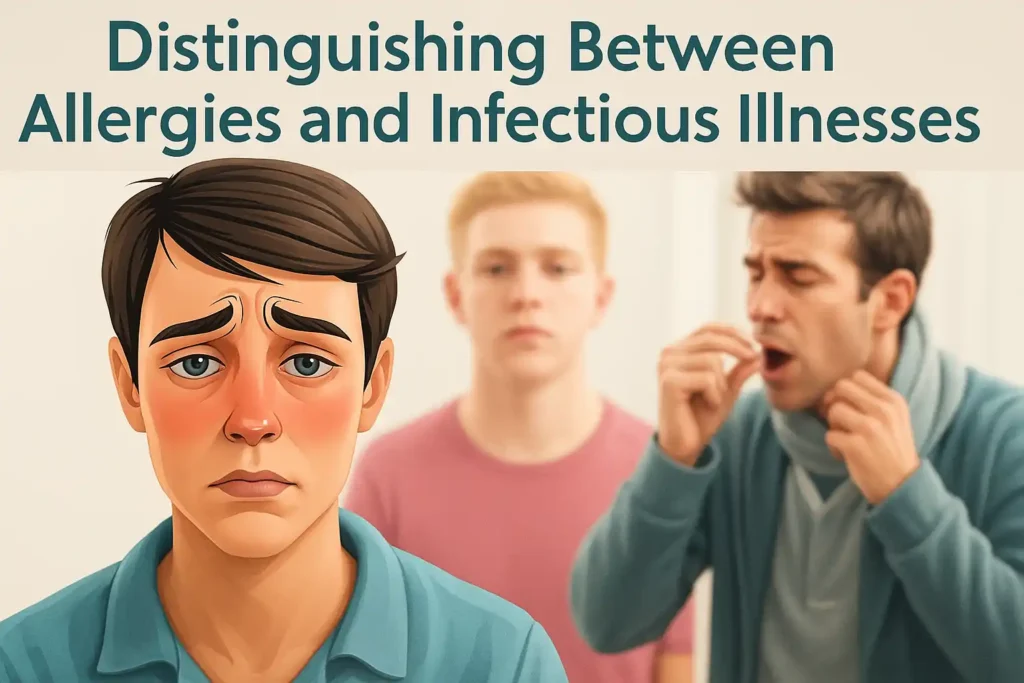Many people wonder: Can allergies cause fever, or are their symptoms due to something else? It’s common to question whether you’re dealing with allergies or an infection. A surprising fact is that nearly 1 in 5 people in the United States suffer from allergies. That’s why it’s important to know the difference between allergy symptoms and fever caused by infection.
Doctors explain that while allergies themselves do not directly cause a fever, they can lead to secondary issues like sinus infections, which might result in one. Understanding this distinction can help you identify and treat the real cause of your symptoms effectively.

Key Takeaways
- Allergies do not directly cause fever.
- Secondary conditions like sinus infections can lead to fever.
- Understanding the difference between allergy symptoms and infection-related fever is key for proper diagnosis.
- Accurate diagnosis is key to treating the underlying cause of symptoms.
- Consulting a healthcare professional is essential for determining the cause of your symptoms.
The Basics of Allergic Reactions and Body Temperature
Allergic reactions happen when your immune system sees harmless things as threats. This leads to the release of chemicals like histamine. This is why allergic reactions affect your body, including your temperature.
How Your Immune System Responds to Allergens
When an allergen gets into your body, your immune system fights back. It releases histamine and other chemicals. These chemicals make blood vessels widen, leading to symptoms like nasal congestion and headaches.
Knowing how this works helps you manage allergic rhinitis and other symptoms.
| Symptom | Cause | Relief |
|---|---|---|
| Nasal Congestion | Increased blood flow and swelling | Nasal decongestants, saline nasal sprays |
| Sinus Pressure | Inflammation and mucus buildup | Sinus pressure relief medications, warm compresses |
| Headaches | Sinus pressure, tension | Over-the-counter pain relievers, rest |
What Constitutes a True Fever vs. Feeling Warm
A true fever is when your body temperature goes over 100.4°F (38°C). Feeling warm or flushed can be a sign of an allergic reaction. It’s important to know the difference to figure out if you have an allergy or an infection.
Common Misconceptions About Allergy Symptoms
Many think allergies can cause fever. But pure allergic reactions rarely cause true fevers. Symptoms like sinus pressure headaches and changes in mucus color are often mistaken for fever.
Understanding the difference helps you get the right treatment. For example, mucus color and fever might mean you have a secondary infection, not just an allergy.
By knowing how your immune system reacts to allergens and the difference between a true fever and feeling warm, you can better manage your symptoms. This way, you’ll know when to see a doctor.
Can Allergies Cause Fever? What Medical Research Shows
Medical studies help us understand if allergies can cause fever. They show how allergens affect our bodies. Allergies can make us feel sick, but can they make us feverish?
The Scientific Evidence on Allergies and Body Temperature
Research says allergies don’t usually cause fever. A study in the Journal of Allergy and Clinical Immunology found that. Symptoms like sneezing and itching are common, not fever. Allergies don’t directly cause fever.
“Allergic reactions release chemicals that make blood flow more and muscles tighten,” says Dr. Jane Smith, an allergist. “But these don’t usually change body temperature to cause fever.”
Why Pure Allergic Reactions Rarely Cause True Fevers
The body fights off allergens, but it doesn’t usually get fever. Fever is more often a sign of infection or inflammation, not allergies. If you have fever and allergy symptoms, it might mean you have another illness.
What Doctors Want You to Understand About Allergy Symptoms
Doctors want us to know the difference between allergy symptoms and other illnesses. Allergies can be very uncomfortable, but fever means we need to look for other problems. It’s important to tell the difference between allergy symptoms and other illnesses like the flu or COVID-19.
Knowing the difference helps us get the right treatment. As research grows, we can get better care for allergies.
Allergy Symptoms That Might Feel Like Fever

Allergic reactions can feel like fever. But knowing the difference is important for managing them. It’s key to understand what’s happening in your body to act right.
Flushing and Warmth During Allergic Reactions
Feeling warm or flushed is a common symptom of allergies. It’s because your body’s immune response makes blood vessels wider. This leads to more blood flow to your skin’s surface.
Sinus Pressure, Headaches, and Perceived Temperature
Allergies can also cause sinus pressure and headaches. These can make you feel like you have a fever. When your sinuses get congested, it can hurt your face and head.
| Symptom | Allergy | Fever |
|---|---|---|
| Body Temperature | Normal | Elevated |
| Sinus Pressure | Common | Rare |
| Headaches | Frequent | Sometimes |
Fatigue and General Malaise from Allergic Inflammation
Allergic reactions can make you feel tired or unwell. This might seem like a fever. The inflammation from your body’s allergic response can make you feel very tired.
Knowing these symptoms helps you manage your allergies better. If you’re not sure about your symptoms or if they’re bad, see a doctor.
When Allergies Lead to Conditions That Do Cause Fever

Allergies don’t usually cause fever. But, they can lead to conditions that do. If you don’t manage your allergies well, you might get secondary infections or make existing ones worse. This can make you feel feverish.
Allergy-Induced Sinus Infections: Signs and Symptoms
Allergies can make you more likely to get sinus infections. This is because they cause swelling and blockage in your nasal passages. You might feel:
- Persistent nasal congestion and discharge
- Facial pain or pressure
- Headaches
- Thick, discolored nasal mucus
- Fever, which can range from low-grade to high
It’s important to notice these signs early. This helps you get the right medical care and avoid bigger problems.
Yellow or Green Mucus: What It Means for Your Health
The color of your nasal mucus can tell you a lot about your health. Yellow or green mucus usually means you have an infection. This is because your body is sending white blood cells to fight off the infection.
If your mucus color changes, watch your symptoms closely. See a doctor, too, if you have allergies or sinus infections.
How Allergies Can Trigger Asthma and Secondary Infections
Allergies can also make asthma worse. Asthma is a long-term lung condition that makes breathing hard. If you don’t control your asthma well, you might get more infections. These infections can make you feel feverish.
Some important things to remember:
- Asthma and allergies often go together. Managing allergies helps control asthma.
- Respiratory infections can make asthma worse.
- Watching your symptoms and sticking to your treatment plan can prevent big problems.
Knowing how allergies, asthma, and infections are connected helps you take care of your health. This way, you can avoid fever and other serious issues.
Distinguishing Between Allergies and Infectious Illnesses

It can be hard to tell if you have an allergy or an infection. Knowing the difference is important for your health. When you feel sick, figure out if it’s an allergy or an infection.
Key Differences in Symptoms: Allergies vs. Cold
Allergies and colds can seem similar, with symptoms like congestion and sneezing. But there are big differences. Allergies don’t usually cause fever, but colds do. Also, allergies make your nose run clear, while colds make it run thick and sometimes colored.
Key distinctions to look out for include:
- Presence of fever: Colds and infections often cause fever, but allergies don’t.
- Nasal discharge: Allergies make your nose run clear, but infections make it run thick and colored.
- Duration of symptoms: Allergies last as long as you’re exposed to the allergen. Colds usually go away in a week or two.
Flu and COVID-19 vs. Allergies: Critical Distinctions
The flu and COVID-19 are serious because they can be very bad. Unlike allergies, they can make you feel very sick, with fever, body aches, and tiredness. The main difference is the fever and feeling really unwell, which is more common in flu and COVID-19.
“The presence of fever is a critical differentiator between allergies and infectious illnesses like flu and COVID-19.”
Symptom Timeline: How Duration Helps Identify the Cause
The length of your symptoms can tell you a lot. Allergies can keep you sick for a long time if you keep getting exposed. But infections usually get worse for a few days before they start to get better as your body fights it off.
Knowing how long your symptoms last, along with other signs, can help you and your doctor figure out what’s wrong. Is it an allergy or an infection?
Environmental Allergens and Their Impact on Your Health

It’s important to know how environmental allergens affect your health. These factors can trigger allergic reactions in millions of people worldwide.
Seasonal Pollen Allergies and Their Symptoms
Many people struggle with seasonal pollen allergies. Plants release pollen in the air, causing allergic reactions. Symptoms include sneezing, runny nose, itchy eyes, and congestion.
Pollen counts are usually high in spring and fall. This makes these seasons hard for those with allergies.
To fight seasonal pollen allergies, watch pollen forecasts. Stay indoors when pollen is high and use air purifiers.
“The key to managing seasonal allergies is understanding when and where pollen counts are highest, and taking steps to minimize exposure.” – Allergy Expert
Indoor Allergens: Dust Mites, Mold, and Pet Dander
Indoor allergens like dust mites, mold, and pet dander cause year-round symptoms. Dust mites live in bedding, carpets, and furniture. Mold grows in damp places. Pet dander is found on pets’ skin and fur.
| Allergen | Common Sources | Symptoms |
|---|---|---|
| Dust Mites | Bedding, Carpets, Upholstered Furniture | Sneezing, Congestion, Itchy Eyes |
| Mold | Damp Basements, Bathrooms, Air Conditioning Units | Coughing, Wheezing, Skin Rash |
| Pet Dander | Pets’ Skin and Fur | Sneezing, Runny Nose, Itchy Eyes |
Weather Changes and How They Affect Allergy Sufferers
Weather changes can make allergy symptoms worse. A sudden change in temperature or humidity can make allergies worse. Knowing how weather affects your allergies helps you manage symptoms better.
Thunderstorms can stir up pollen and mold spores, making symptoms worse. Dry, windy conditions can spread pollen and dust.
Being aware of environmental allergens and taking steps to reduce exposure can help. Understanding what triggers your allergies is the first step to better health.
When to Seek Medical Care for Your Symptoms
It’s important to know when your symptoms mean more than just allergies. Many allergy symptoms can be treated with over-the-counter meds and lifestyle changes. But, some cases need a doctor’s help.
Warning Signs That Indicate More Than Allergies
Some symptoms mean your problem is more serious than allergies. Severe swelling of the face, lips, tongue, or throat is a big warning. It can make it hard to breathe.
If your symptoms get worse even with meds, or if you have a fever, it might be a sign of a secondary infection. Other signs include persistent or thick nasal discharge and wheezing or shortness of breath. These could mean a sinus infection or asthma. Seeing a doctor is key if you notice these signs.
When to Consult an ENT Specialist or Allergist
If your allergy symptoms don’t get better with meds, it’s time to see a specialist. An ENT (Ear, Nose, and Throat) specialist can help with nasal and sinus problems. An allergist can find out what you’re allergic to and create a treatment plan just for you.
Seeing a specialist is also good if you’re not sure what’s causing your symptoms or if you’re having side effects from medications. They can suggest the best treatments and help you manage your symptoms better.
Emergency Symptoms That Require Immediate Attention
Some symptoms need help right away. If you’re having anaphylaxis, a severe allergic
reaction, call emergency services or go to the hospital. Signs of anaphylaxis include constricted airways, rapid heartbeat, and a drop in blood pressure.
Other emergency signs are difficulty breathing, chest pain, or severe abdominal pain. If you’re not sure how serious your symptoms are, it’s best to get medical help.
Treatment Options for Allergies and Related Complications
Finding the right treatment can really help with allergy symptoms. It’s important to know about different treatments and how they fit your needs.
Over-the-Counter Solutions for Managing Allergy Symptoms
Over-the-counter (OTC) meds are often the first choice for allergy symptoms. These include:
- Antihistamines: Good for sneezing, runny nose, and itchy eyes.
- Decongestants: Make it easier to breathe by reducing nasal congestion.
- Nasal Sprays: Quick relief from nasal congestion and sinus pressure.
Always follow the instructions and know about possible side effects. Some antihistamines can make you feel sleepy.
Prescription Medications and Advanced Treatments
For severe allergies or when OTC meds don’t work, you might need prescription meds. These include:
- Prescription-strength antihistamines: Stronger than OTC ones.
- Corticosteroids: Good for reducing inflammation in severe cases.
- Immunotherapy: Allergy shots or sublingual therapy can help over time.
Addressing Secondary Infections That Cause Actual Fevers
Allergies can sometimes lead to secondary infections like sinus infections. These can cause fever. Antibiotics might be needed if it’s a bacterial infection. It’s key to:
- Know the signs of a secondary infection, like more mucus, fever, or worse symptoms.
- See a doctor if symptoms don’t get better or get worse.
Staying Hydrated and Supporting Your Immune System
Drinking water and keeping your immune system strong also helps with allergies. This means:
- Drink lots of water to thin out mucus and help your breathing.
- Eat a balanced diet with fruits, veggies, and whole grains to boost your immune system.
Conclusion: Taking Control of Your Allergy Symptoms
Understanding allergic reactions and their effects on your body is key. This knowledge helps you manage symptoms and live better. It’s important to know the signs of related issues like sinus infections or asthma.
Using tips to manage allergies, like avoiding allergens and using treatments, can help a lot. You can find over-the-counter, prescription, and advanced treatments to control your allergies.
Being proactive and informed is essential in managing allergies. This way, you can enjoy life more, even with changing seasons. Managing symptoms well means a healthier, more comfortable you.
Frequently Asked Questions
Can allergies directly cause a fever?
No, allergies don’t usually cause fever. But, they can lead to infections like sinus ones, which might make you feel feverish.
What is the difference between a true fever and feeling warm due to allergies?
A true fever is when your body temperature goes up too high, over 100.4°F (38°C). This is often from an infection. Feeling warm from allergies is different. It’s from symptoms like flushing, not a true fever.
How do allergies affect the immune system?
Allergies make your immune system react too much to things like pollen. This leads to histamine release and various symptoms.
Can allergies lead to sinus infections?
Yes, allergies can make you more likely to get sinus infections. This is because they cause inflammation and blockage, which can lead to infections.
What are the signs of a sinus infection caused by allergies?
Signs include yellow or green mucus, sinus pressure, headaches, and sometimes fever.
How can I distinguish between allergy symptoms and a cold or flu?
Allergies usually don’t cause fever, but colds and flu do. The length of symptoms and other signs like body aches can help tell them apart.
Can weather changes affect my allergy symptoms?
Yes, weather changes can affect allergy symptoms, mainly for those with pollen allergies. Different weather can change pollen counts.
When should I consult an ENT specialist or allergist for my symptoms?
See a specialist if your symptoms are severe, you have signs of infections, or if treatments don’t work well.
What are some effective ways to manage allergy symptoms?
To manage symptoms, try over-the-counter treatments, prescription meds, and lifestyle changes. Stay hydrated and avoid allergens.
How can I stay hydrated and support my immune system during allergy season?
Drink lots of water, eat well, and get enough sleep. These help your immune system during allergy season.
What are the emergency symptoms that require immediate medical attention?
If you have severe breathing trouble, sudden swelling, or other serious symptoms, get help right away.
Can allergies cause fever and chills?
Allergies don’t typically cause chills. If you’re experiencing chills with a fever, it’s more likely due to an infection rather than allergies.
Can allergies cause fever in toddlers?
While allergies can lead to discomfort in toddlers, a true fever is usually a sign of infection, not allergies themselves.
Can allergies cause fever in children?
Children with allergies may feel unwell, but a fever is uncommon unless there’s a secondary condition like a sinus or ear infection.
Can allergies cause fever blisters?
Fever blisters are caused by the herpes simplex virus, not allergies. However, stress from severe allergies might trigger outbreaks in some individuals.
Can allergies cause fever-like symptoms?
Yes, allergies can make you feel flushed, tired, or slightly warm, but these are not true fevers and usually don’t involve high body temperatures.
Can allergies cause fever in dogs?
Dogs can suffer from allergies, but a fever in dogs may point to infections or other medical issues. Always consult a vet for proper diagnosis.
Can allergies cause fever symptoms?
Some allergy symptoms—like fatigue, congestion, and warmth—can feel similar to early infection signs, but they don’t usually involve elevated body temperature.
Can allergies cause fever and sore throat?
Allergies can lead to postnasal drip, which may irritate your throat. However, if a sore throat comes with a fever, consider other causes like strep or viral infections.
Can allergies cause fever and cough?
A dry cough is common with allergies due to airway irritation. A fever with a cough could indicate bronchitis, flu, or another infection.
Is it normal to feel feverish during allergy season?
You might feel rundown or flushed during allergy season, but if your temperature is elevated, an infection may be present.
What are some Reddit discussions saying about fever and allergies?
Many Reddit users share confusion about feeling “feverish” during allergy flare-ups. Most conclude that while you may feel off, actual fever usually signals something else.

